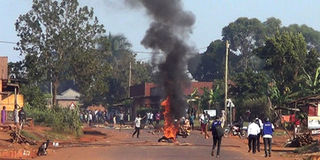Prime
Eight arrested as protestors block Jinja-Kamuli road over skyrocketing food, fuel prices

Police deployed to disperse protestors in Namulesa along Jinja-Kamuli highway in JInja City on July 11, 2022. The protestors had blocked the road over high food and fuel prices. PHOTO/DENIS EDEMA
Traffic and business along Jinja-Kamuli highway in Jinja District was on Monday paralysed for hours after protestors blocked the road over government inaction to cushion vulnerable Ugandans against the skyrocketing food and fuel prices.
The protestors, mostly boda boda riders, taxi drivers, small business operators and residents of Namulesa trading centre along the road mobilized themselves Monday morning and blocked the road using stones, bricks, tree branches, logs and burning tyres, arguing that they’re choking on high food prices and blamed government for doing nothing to alleviate the situation.
Travelers who were reluctant to join the protest were beaten and blocked from passing through.
One of the protestors, Mr Chaarles Karoli, who operates a barbershop in Namulesa said the current situation in the country seems to indicate that Uganda belongs only to the privileged and politicians who can afford essential commodities.
Uganda for the rich and privileged?
“It seems Uganda belongs to only the rich. The common people like me are treated as if we don’t belong here. Even the politicians, especially our MPs seem not to care. It’s like we voted for them to go to Parliament to become rich and forget about us. It’s like they don’t know what’s happening in their constituencies,” he said.
Another protestor, Mr Joseph Mukiibi warned that they will not relent until government intervenes with short term solutions to the current economic crisis in the country which government officials have in the recent past to Covid-19 pandemic and said it was exacerbated by Russia’s invasion of Ukraine which distorted the global supply chain.
“People are not eating well. Others are sleeping on empty stomachs. Some of our children have become malnourished, businesses have closed because there are no buyers. The most affected persons are those in semi-rural and rural areas,” Mr Mukiibi said.
The protestors were however, dispersed by teargas fired by security operatives who intervened to contain the situation.
Dispersed with teargas
Kiira region police spokesperson, Mr James Mubi condemned the protestors arguing that blocking a public road was against the law.
“Our mandate as police is to keep law and order. I totally condemn our brothers in the boda boda and taxi business for blocking public roads and demanding money from travelers. It is very bad,” he said.
He said 11 motorcycles had been impounded and eight protestors arrested for questioning as police investigates.

Residents burn tyres and pile logs on a section of Jinja-Kamuli road at Namulesa Trading Centre in Jinja City on July 11, 2022 as they protested over the high prices of commodities and general rising cost of living in Uganda. PHOTO/ DENIS EDEMA
“We have information that the protestors are being mobilized by some politicians. We are going to summon them for questioning. They are supposed to sensitize the community to understand what is currently happening in the world, not to incite them,” Mr Mubi added.
According to him, the suspects will be charged with incitement to violence and blocking public roads.
The protest comes barely two weeks after former presidential candidate, Dr Kizza Besigye and political activist Samuel Lubega Mukaaku were on July 1 released on bail after being remanded for weeks for exhorting Ugandans to rise up against government inaction to cushion vulnerable citizens against skyrocketing commodity prices.
Temporary situation
During his State of the Nation Address last month, President Museveni spoke fleetingly about the current cost of living crisis. Mr Museveni described the current inflationary pressures as transitory.
“When it comes to the recent high commodity prices caused, initially, by the relaunch of the world economy after the two years of lockdown and, additionally, by the war in Ukraine, our decision, after careful analysis, is to avoid the traps of tax cuts and subsidies,” Mr Museveni said.
Mr Museveni also announced that Uganda had hit the GDP per capita entry points to be admitted to the middle income status. This would imply every Ugandan earning Shs3.7m per annum.
This has, however, been disputed by the World Bank.
What Museveni’s government is doing
But as other regional governments initiate policies in attempt to cushion their citizens against the rising inflation, Uganda’s Finance Minister, Mr Matia Kasaija in his budget speech on June 14 highlighted the speeding up socio-economic transformation through creation of jobs and wealth as one of the key objectives of the Shs48 trillion budget.
“The NRM government’s overriding goal is to achieve socio- economic transformation for the benefit of all Ugandans and thus improve their lives. We must, therefore, quickly accelerate the economic recovery that we began in Financial Year 2021/2022, integrate more Ugandans into the money economy, and speed up growth in the country’s productive sectors,” Mr Kasaija said.
ALSO READ: Highlights from Kasaija’s budget speech
Mr Kasaija also highlighted the initiatives government will undertake to alleviate poverty, key among them being the Parish Development Model.
The budget speech also stated government commitment to support businesses and the overall economy to recover from the impact of the Covid-19 pandemic and restore the lost jobs and livelihoods through other government programmes such as the highly criticized Emyooga Fund, the Microfinance Support Centre credit to other Saccos, the Small Business Recovery Fund, and other wealth creation initiatives.




